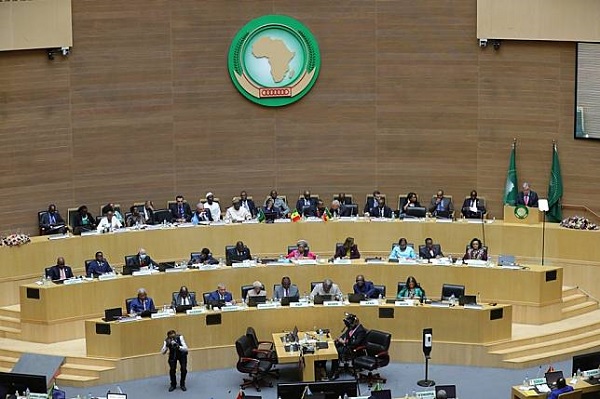
The African Union (AU) has announced that the parties involved in the northern Ethiopia conflict have reiterated their commitment to implementing the Pretoria Cessation of Hostilities Agreement (COHA). In a first strategic review held on March 11, 2024, the AU highlighted the progress made and identified areas that require further joint efforts to fully implement the agreement. The review was attended by negotiators, both sides’ representatives from the federal government and Tigray interim Administration, as well as the United States and the European Union.
During the review, Moussa Faki Mahamat, Chairperson of the AU Commission (AUC), outlined several key achievements since the signing of the agreement. These include the immediate cessation of hostilities, the handover of heavy and medium weapons, the resumption of essential services, and the reopening of schools and economic activities in most parts of the Tigray region. The commissioner also commended the establishment of the Interim Regional Administration in Tigray and the National Commission for Reintegration, with the AU’s support to the working group on transitional justice.
However, the commissioner emphasized that important issues such as political dialogue, transitional justice, and Disarmament, Demobilization, and Reintegration (DDR) still require urgent attention. He urged the parties to continue collaborating and compromising, underscoring the significance of their commitment to achieving lasting peace in the region. He reiterated the AU’s role in supporting Ethiopia-led efforts and expressed readiness to provide further assistance.
The commissioner further emphasized that achieving durable and lasting peace in Tigray not only benefits Ethiopia but also the entire Horn of African region. He urged all stakeholders to remain steadfast as the process reaches a crucial point, highlighting the need to consolidate the gains made thus far. The AU remains determined to support efforts aimed at restoring lasting peace, stability, and development in Tigray.
The G7 countries, along with the European Union delegation, jointly issued a statement following a strategic review conducted in Addis Ababa. They expressed their support for the discussions held to review the implementation of the peace agreement.
The statement emphasized the positive outcomes resulting from the signing of the peace agreement, stating that the sound of bullets has ceased, thereby creating an environment conducive to the unrestricted provision of humanitarian aid and the resumption of basic services in the region. Additionally, the statement highlighted the importance of establishing an interim administration for the region.
To facilitate a favorable situation going forward, the statement emphasized the need for a budget to facilitate the reintegration of ex-combatants into society, urgent support for war-affected individuals, reconstruction efforts, victim-centered transitional justice, and accountability measures. The statement also assured that the return of internally displaced persons to their villages is both safe and voluntary.
Furthermore, the G7 and the European Union commended the activities of the monitoring group established by the African Union to oversee the agreement. They also called for a resolution of conflicts in the Amhara and Oromia regions through dialogue.
After days of the strategic review Prime Minister Abiy Ahmed engaged in a discussion with representatives from the Tigray regional state. The prime minister acknowledged the successes achieved following the Pretoria peace deal, including the absence of casualties due to gun violence, improved stability in the region, the establishment of interim administrative structures, and the removal of the TPLF name from the list of terrorist organizations. The prime minister also highlighted the provision of substantial financial and material support to Tigray.
Regarding prisoners, Prime Minister Abiy stated that many have been released, and members of the Ethiopian National Defense Forces (ENDF) who were suspended during the conflict have resumed their duties following the peace pact. He emphasized the government’s commitment to facilitating the return of displaced communities to their homes based on the agreement. The prime minister stated that once stability is restored and all displaced persons have returned, a referendum will be held to address the border dispute with the Amhara regional state.
Prime Minister Abiy further encouraged investors who left during the conflict to return, assuring resolution of any outstanding issues. He denounced the politicization of hunger-related matters and reaffirmed the government’s support in addressing such challenges. Regarding reports that lands occupied by Eritrea, he mentioned the establishment of a joint committee to assess the situation in collaboration with Tigray representatives. The prime minister emphasized adherence to the Algiers Agreement and pledged to make the findings public.
In his stay with EPA Gebrehiwot Gebre Egzabiher (PhD), Commissioner of Disaster Risk Management of the Tigray Region Interim Administration, noted the relative peace prevailing in most areas of the region following the Pretoria Peace Agreement. He highlighted the cessation of war and the provision of limited humanitarian assistance, particularly related to food and nutrition. He thanked the federal government and other humanitarian organizations for their support in this regard.
He highlighted that humanitarian aid was provided to 15 cities a fortnight ago in regions that lacked support from other partners. Currently, the partners are only able to support 20 percent of their capacity, but there are plans to increase this support. At present, there is an urgent requirement for food aid for approximately 4.5 million citizens. The commissioner emphasized that around 1.1 million citizens are displaced in various camps and efforts should be made to facilitate their resettlement.
It is recalled that the conflict in northern Ethiopia began in November 2020 when forces loyal to the TPLF launched an attack on federal military bases. In response, the Ethiopian government initiated a military offensive, resulting in widespread violence, displacement of civilians, and the destruction of infrastructure. Also, the war has had biting economic, and political ramifications, triggering national instability and beyond. Accordingly, many innocent people were massacred and raped including women, and children. The conflict also displaced millions of people.
With various internal and external actors throwing their full weight behind the war to impose their interests, the misinformation campaign was intense that it besmirched the image of the country. The barrage of misinformation also triggered unwarranted pressure against the country. Some countries even slapped the country with sanctions including the suspension of the African Growth Opportunity Act (AGOA). So, it is apparently clear that the war cost the country dearly.
However, owing to the resolve of the incumbent, on Nov. 2, 2022, the federal government and TPLF inked an AU-brokered peace deal in Pretoria, South Africa. The accord silenced the guns and turned hostilities to relative normalcy as the ceasefire holds.
BY EYUEL KIFLU
THE ETHIOPIAN HERALD TUESDAY 19 MARCH 2024




